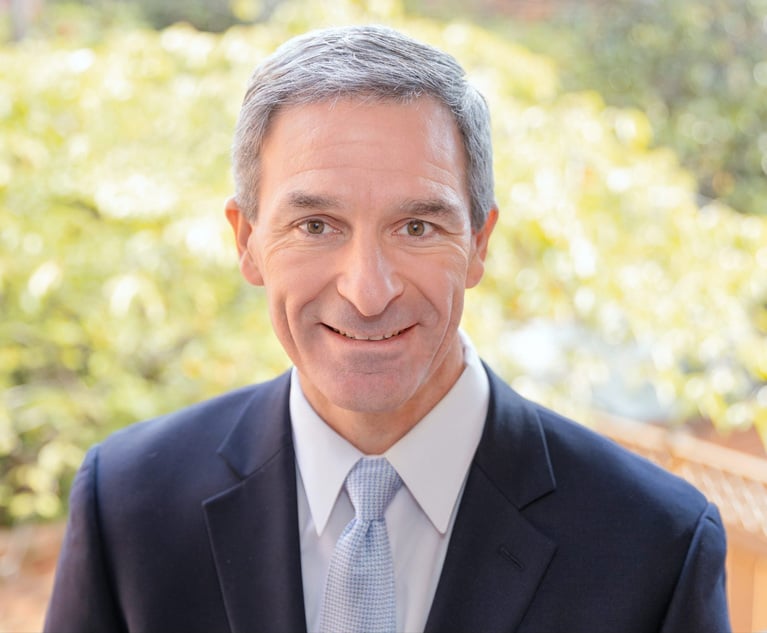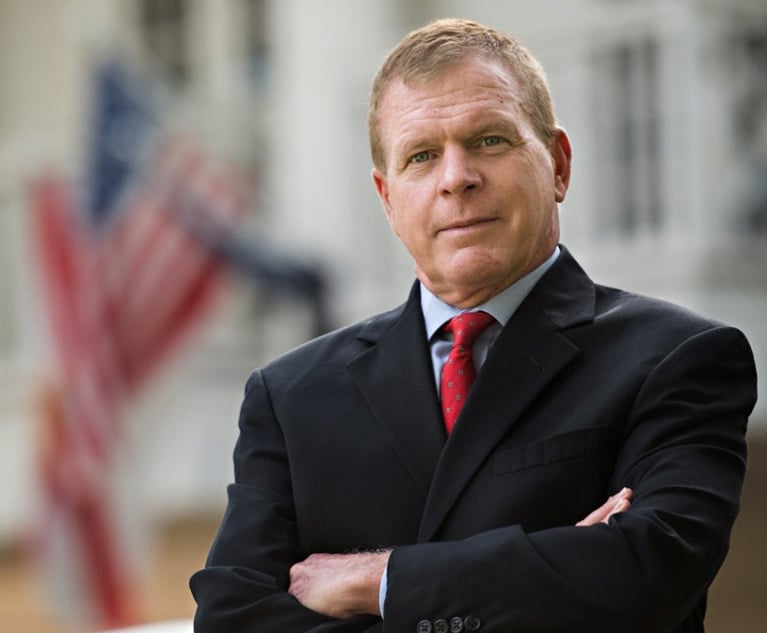Flattening the Curve: State COVID-19 Immunity Initiatives Help Suppress a Surge in New Class Action Litigation
Legal practitioners originally anticipated a surge of pandemic-related class actions arising in the health care sector at the onset of the COVID-19 pandemic. But that surge has not materialized.
June 26, 2020 at 05:24 PM
5 minute read

At the onset of the COVID-19 pandemic, legal practitioners anticipated a surge of pandemic-related class actions arising in the health care sector. Daily headlines noted an ever-increasing number of confirmed COVID-19 cases in hospitals and assisted living facilities, alarming shortages of personal protective equipment (commonly known as PPE), inadequate medical staffing and potential lapses in patient care. But that surge has not materialized.
This surprising development is attributable, in part, to the many new state initiatives shielding health care providers from civil liability and suppressing related class action litigation during the pandemic.
A New COVID-19 Defense for the Health Care Industry
To date, at least 28 states and the District of Columbia have enacted executive orders or passed legislation granting some type of immunity to health care workers and care facilities related to the pandemic. These jurisdictions include Alabama, Alaska, Arizona, Arkansas, Connecticut, the District of Columbia, Georgia, Hawaii, Illinois, Iowa, Kansas, Kentucky, Louisiana, Maryland, Massachusetts, Michigan, Mississippi, Nevada, New Jersey, New York, North Carolina, Oklahoma, Pennsylvania, Rhode Island, Utah, Vermont, Virginia, Wisconsin and Wyoming.
Potential claimants disproportionately reside in these jurisdictions. As of publication, they are home to more than one million confirmed cases of the novel coronavirus, accounting for almost 70% of all confirmed cases nationwide. Notably, four of these states alone—New York, New Jersey, Illinois and Massachusetts—account for nearly 35% of all cases in the United States.
Although the scope of COVID-19-related immunity differs across jurisdictions, certain general trends are apparent.
Broad Immunity for Civil Claims
States' efforts to react quickly in the face of the pandemic's unknown scope and severity often resulted in broadly worded immunity covering, in some instances, virtually all activities related to COVID-19 health care. For instance, New York amended Section 3082 of its Public Health Law on April 6 to extend immunity to health care facilities "from any liability, civil or criminal, for any harm or damages alleged to have been sustained as a result of an act or omission in the course of arranging for or providing health care services" if done in "good faith" and related to COVID-19.
Additionally, some states have expressly barred claims relating to insufficient resources, such as PPE or staffing. For example, Mississippi's Executive Order 1471, signed April 10, notes that health care facilities are not liable for "acts or omissions undertaken because of a lack of resources … that otherwise would have been required in the absence of the COVID-19 pandemic."
Liability Remains for Egregious Conduct
Despite typically broad grants of immunity, these new COVID-19 defenses are not absolute. Across all states, immunity does not cover egregious conduct, defined variously, among other things, as gross negligence, recklessness, willful or wanton misconduct, or criminal activity.
Plaintiffs attorneys in the few health care-related class actions filed to date have thus asserted claims for gross negligence or other egregious misconduct in an apparent attempt to overcome the COVID-19 immunity defense. For example, a complaint filed May 18 on behalf of a putative class of nursing home residents at Andover Subacute Rehabilitation Center in New Jersey alleges that the facility failed "to monitor outside visitors to the facilities," and provide sufficient PPE to housekeepers, therapists and nursing assistants. Plaintiffs allege these failures were "grossly reckless, willful, and wanton," resulting in the deaths of more than 50 residents from COVID-19. In response, on June 3, the facility asserted, among other defenses, that its COVID-related immunity under New Jersey law barred the plaintiff's claims. While the outcome is unknown, other facilities hit hard by COVID-19 will undoubtedly assert any applicable COVID-19 defenses to counter their class action claims as well.
Even if the plaintiffs in these cases can allege sufficiently egregious conduct to overcome a COVID-19 defense, class certification may be an uphill battle because evaluating whether a particular class member's claim is barred by COVID-19 immunity will typically be an individualized question—i.e., whether there was gross negligence, recklessness, willful or wanton misconduct, or criminal activity—will typically require case-by-case consideration, rather than class treatment.
Immunity Duration Is Uncertain
In 23 jurisdictions, immunity provisions will expire automatically at the end of the declared emergency, unless repealed earlier. In Arizona, Mississippi, Rhode Island and Vermont, executive orders provide immunity through a fixed date, subject to further extension. Wisconsin Statute Chapter 895.4801 combines these approaches; extending immunity to 60 days after the state of emergency is lifted. Adding another layer of complexity, some jurisdictions have tolled statutes of limitation to compensate for court closures and other delays caused by stay-at-home orders. For instance, on May 22, the Maryland Court of Appeals issued an Administrative Order tolling the statute of limitations for all cases equal to the length of closure, plus an additional 15 days.
Looking forward, a surge of class action claims against health care providers is unlikely to materialize before states revoke or end these immunity provisions. Health care providers should be mindful, however, that evolving circumstances and each jurisdiction's response could affect the scope and duration of applicable COVID-19 defenses. Additionally, providers could still be liable for acts that predate emergency declarations or that arise after their expiration. Despite this uncertainty, health care providers should take comfort in the near term that many likely face reduced exposure from COVID-19 claims for the duration of their jurisdictions' emergency orders, except for egregious acts.
Holly Loiseau is a partner in Washington, D.C., David Singh is a partner in Silicon Valley, Carl Duffield is counsel in Washington, D.C., and John Haigh is an associate in Washington, D.C. All are members of the global litigation department at Weil, Gotshal & Manges.
This content has been archived. It is available through our partners, LexisNexis® and Bloomberg Law.
To view this content, please continue to their sites.
Not a Lexis Subscriber?
Subscribe Now
Not a Bloomberg Law Subscriber?
Subscribe Now
NOT FOR REPRINT
© 2025 ALM Global, LLC, All Rights Reserved. Request academic re-use from www.copyright.com. All other uses, submit a request to [email protected]. For more information visit Asset & Logo Licensing.
You Might Like
View All


Restoring Antitrust: Returning to the Consumer Welfare Standard
Law Firms Mentioned
Trending Stories
- 1Thursday Newspaper
- 2Public Notices/Calendars
- 3Judicial Ethics Opinion 24-117
- 4Rejuvenation of a Sharp Employer Non-Compete Tool: Delaware Supreme Court Reinvigorates the Employee Choice Doctrine
- 5Mastering Litigation in New York’s Commercial Division Part V, Leave It to the Experts: Expert Discovery in the New York Commercial Division
Who Got The Work
J. Brugh Lower of Gibbons has entered an appearance for industrial equipment supplier Devco Corporation in a pending trademark infringement lawsuit. The suit, accusing the defendant of selling knock-off Graco products, was filed Dec. 18 in New Jersey District Court by Rivkin Radler on behalf of Graco Inc. and Graco Minnesota. The case, assigned to U.S. District Judge Zahid N. Quraishi, is 3:24-cv-11294, Graco Inc. et al v. Devco Corporation.
Who Got The Work
Rebecca Maller-Stein and Kent A. Yalowitz of Arnold & Porter Kaye Scholer have entered their appearances for Hanaco Venture Capital and its executives, Lior Prosor and David Frankel, in a pending securities lawsuit. The action, filed on Dec. 24 in New York Southern District Court by Zell, Aron & Co. on behalf of Goldeneye Advisors, accuses the defendants of negligently and fraudulently managing the plaintiff's $1 million investment. The case, assigned to U.S. District Judge Vernon S. Broderick, is 1:24-cv-09918, Goldeneye Advisors, LLC v. Hanaco Venture Capital, Ltd. et al.
Who Got The Work
Attorneys from A&O Shearman has stepped in as defense counsel for Toronto-Dominion Bank and other defendants in a pending securities class action. The suit, filed Dec. 11 in New York Southern District Court by Bleichmar Fonti & Auld, accuses the defendants of concealing the bank's 'pervasive' deficiencies in regards to its compliance with the Bank Secrecy Act and the quality of its anti-money laundering controls. The case, assigned to U.S. District Judge Arun Subramanian, is 1:24-cv-09445, Gonzalez v. The Toronto-Dominion Bank et al.
Who Got The Work
Crown Castle International, a Pennsylvania company providing shared communications infrastructure, has turned to Luke D. Wolf of Gordon Rees Scully Mansukhani to fend off a pending breach-of-contract lawsuit. The court action, filed Nov. 25 in Michigan Eastern District Court by Hooper Hathaway PC on behalf of The Town Residences LLC, accuses Crown Castle of failing to transfer approximately $30,000 in utility payments from T-Mobile in breach of a roof-top lease and assignment agreement. The case, assigned to U.S. District Judge Susan K. Declercq, is 2:24-cv-13131, The Town Residences LLC v. T-Mobile US, Inc. et al.
Who Got The Work
Wilfred P. Coronato and Daniel M. Schwartz of McCarter & English have stepped in as defense counsel to Electrolux Home Products Inc. in a pending product liability lawsuit. The court action, filed Nov. 26 in New York Eastern District Court by Poulos Lopiccolo PC and Nagel Rice LLP on behalf of David Stern, alleges that the defendant's refrigerators’ drawers and shelving repeatedly break and fall apart within months after purchase. The case, assigned to U.S. District Judge Joan M. Azrack, is 2:24-cv-08204, Stern v. Electrolux Home Products, Inc.
Featured Firms
Law Offices of Gary Martin Hays & Associates, P.C.
(470) 294-1674
Law Offices of Mark E. Salomone
(857) 444-6468
Smith & Hassler
(713) 739-1250









